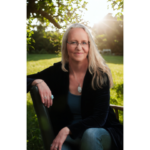I’d forgotten about the stars.
Not “forgotten” forgotten. I knew they were still up there, but they’d fallen off my radar. All summer long, when the dogs dragged me out of bed at 4 a.m., the sky was already moving into dawn. And when I’d crawl into bed at the other end of the day, the sun was still shining. By the end of summer, there were a few pale stars in the morning and at night, but not enough to really register until, seemingly suddenly and all at once, the early morning sky was breathtakingly full of lights.
I remember first learning as a child that the stars don’t really magically appear at night, that they are always there in the sky. We just don’t see them. I was blown away by this. Maybe even a tiny bit disbelieving. If something is really right there – something as awe inspiring and full of wonder as a sky full of stars – how can you not see it?
Life has taught me that stars are not the only thing I can’t see that is right in front of my eyes. Sometimes it’s my car keys. The other day it was the letter “E.”
I was playing my daily Wordle when the “E” went AWOL. If you’re not a Wordler, the goal of this online game is to guess a five-letter word. On this day, with this particular Wordle, I had become convinced that the creators of the game had lost their ever-loving minds. Given the particular constellation of vowels and consonants I’d already tried, and those still available to me, there was no possible way the word I was trying to guess existed in the English language. I was seriously annoyed with the obviously diabolical people responsible for this travesty.
And then I stepped away from the game to do something else. I shifted my focus, my attitude, and my mood. And when I looked at the puzzle again, I realized that I had not, in fact, ever tried an “E.” And that the “E” was sitting right there looking at me (smugly, I felt), available for deployment. The puzzle word was actually just an ordinary English word, not a particularly difficult Wordle puzzle at all. The only problem had been in my own mind, where I’d convinced myself that the puzzle was impossible to solve.
This sort of thing happens a lot in our everyday lives. We talk ourselves into beliefs, mindsets, and expectations, and then we’re not able to see anything that doesn’t fit with what we’re thinking. Like the car keys that we’re certain we’ve lost, sitting right there on the counter where we left them.
Sometimes what we can’t see is the solution to a problem. Recently I had myself convinced that I was never going to be able to leave the house for more than a few hours at a time for the rest of my life. Or at least, for the rest of the life of my adopted shelter dog, Fitz, who is afraid of everything and everybody. I left him in boarding for a few days last year and it didn’t go well. As a result, I’d begun to tell myself a whole woe-is-me story about how I would never be able to do anything or go anywhere.
And then, sort of like the stars becoming suddenly visible in the sky, it occurred to me to actually check around Colville and see if I could find a solution. And lo and behold, I discovered Colville Critter Camp, within a 15-minute drive of my house. This fabulous place offers doggy day care, which has turned into a weekly playdate and socialization session for my anxious pup. He’s excited about visiting there now, and I feel 100% comfortable about leaving him in full-time boarding when I venture off on an upcoming trip.
I’ve been mulling how to be more open to possibilities lately, making a point of letting go of (or at least becoming more aware of) the thoughts and beliefs that are keeping me from seeing what is right in front of my eyes. If you want to give it a try, I think the first and most important step is being willing to let go of current thoughts and beliefs and accepting the possibility that there are other options right there in front of you. It can be helpful to make a point of physically opening your hands as you consciously choose to let go and be open to possibility. Then, take a deep breath (or two or three) and ask variations of the following questions:
What might I be overlooking?
I wonder if there’s a way this could be easier or go more smoothly?
What are all of the ways this project/situation could go right?
How else might I look at this situation?
What often works brilliantly is to ask the questions, or write them down, and then go away and do something else while your brain runs an autopilot program.
You might just be surprised by an unexpected answer or solution popping up seemingly out of nowhere.
Colville resident Kerry Schafer (who also writes as Kerry Anne King) is the bestselling author of 14 novels and the co-host of The One Happy Thing Podcast. Learn more at www.allthingskerry.com.

